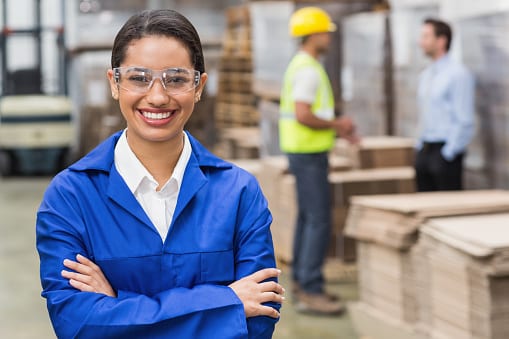Every day, 1,800 people receive emergency treatment for an eye injury that could have been prevented if they had only been wearing protective eyewear. When asked why they hadn’t protected their eyes, people seldom have a good answer. They say, “I forgot” or “It’s not comfortable” or “I didn’t feel like it.” Wearing the proper eyewear shows that you understand the dangers of your job and know how to protect yourself.
Protective glasses are even more important if you’ve had any type of corrective eye surgery or wear contacts. Others at a higher than average risk include those with people with one good eye and one lazy eye. The loss of their good eye would be catastrophic. Kids involved in sports also need the right eyewear. One in five of the eye injuries in kids under 17 occur because the child wasn’t wearing goggles.
Choosing the Right Protective Eyewear
There are a lot of choices, but few people spend much time choosing the glasses or goggles that will best suit their needs. Expect your eye doctor at Florida Eye to ask you about your work, hobbies and any sports you participate in before making a recommendation. Protective eyewear is certainly not a “one-size-fits-all” item.
Eye Protection on the Job
Workplace eye protection can range from a welder’s helmet to surgical protection. Anyone using machine tools needs protection from flying chips of metal or wood splinters. Janitors, construction workers, landscapers, plumbers and many others are all exposed to possible eye injury at work. Employer-supplied safety glasses may not be suitable for your unique requirements (although they will certainly be much better than nothing). Choose eye protection that both protects you on the job and works with your individual vision needs with prescription lenses if needed.
Look for Z87.1 and Polycarbonate Lenses
When buying goggles, check the label or glasses for “Z87.1”. It should state that the goggles meet the ANSI (American National Standards Institute) Z87.1 standard. The eye and at least part of the face will be protected from a sudden impact, a splash from a dangerous liquid, ultraviolet light and many other types of radiation.
Look for a polycarbonate lens; most goggles have them. Polycarbonate is an extremely strong plastic used for bulletproof windows, among other things. You want a lens that is scratch-resistant and absorbs dangerous UV (ultraviolet) rays.
Additional Lens Options
There are several lens options for safety glasses including:
- Clear
- Photochromic (darkens when exposed to sunlight) – photochromic safety glasses have a “V” marking
- Polarized (reduces glare)
- Tinted
Other special markings you may need to look for include:
- “S” for special purpose lenses
- “W” plus a shade number for welders
- “U” plus a scale number indicates UV (ultraviolet) filter
- “R” plus a scale number indicates IR (infrared) filter
- “L” plus a number indicates visible light filter
Sports Goggles
When looking for sports goggles, check for a seal from the Protective Eyewear Certification Council. This indicates the eyewear is safe and designed for the purpose. Both pro athletes and elementary school kids need eye protection. Kids who may not want to wear eye protection can often be convinced when shown that their sports heroes never play the game without it.
In the major leagues, a fastball clocks over 100 mph. It’s said a racquetball could go as fast as 200 mph. Even amateur tennis could see the ball flying at 60 mph or more. The unprotected eye can’t withstand an impact from anything going that fast. Other sports have different challenges, but all athletes, regardless of age, go as hard and fast as they can.
Other players can also be also a danger. Basketball players come in close contact with each other, resulting in a higher than average number of eye injuries.
There are many different types of sports goggles. Look for frames designed for your specific sport and which can accommodate prescription lenses if needed. Again, polycarbonate is best for sports lenses. Most sports frames cushion the head and/or nose area with rubber padding.
There are many specialized needs for protective eyewear which haven’t been mentioned. However, the overall point to remember is that if you know there’s a risk of a foreign object entering your eye, a possible traumatic impact or other danger, protect your vision. The doctors at Florida Eye Specialists and Cataract Institute will be pleased to work with you to find the best protective eyewear for your situation. Contact Florida Eye today to schedule an appointment.



